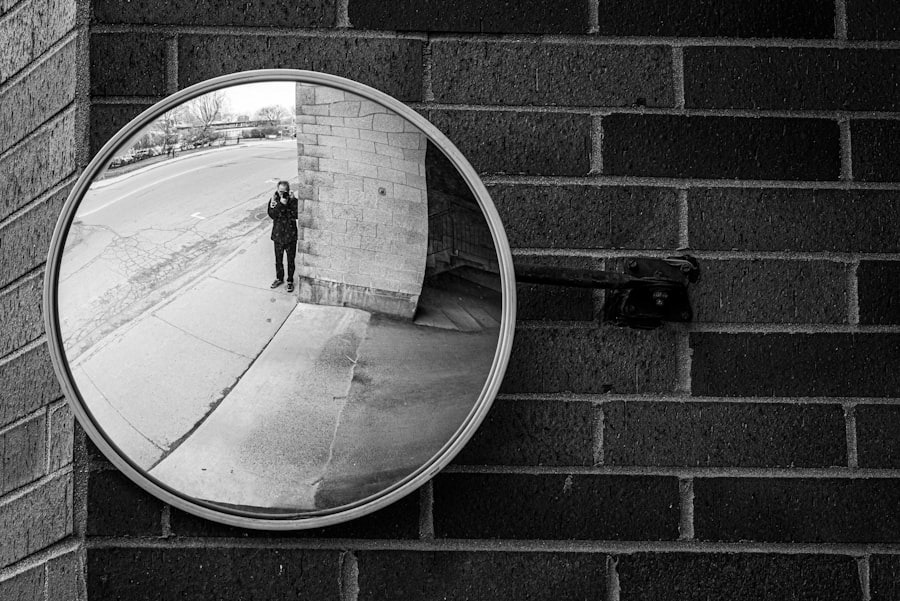Depersonalization and derealization are complex psychological phenomena that can leave individuals feeling detached from themselves or their surroundings. You may find yourself questioning your own identity or feeling as though you are observing your life from a distance, as if you are a character in a movie rather than an active participant. These experiences can be disorienting and unsettling, often leading to confusion and anxiety.
Understanding these conditions is crucial for recognizing their impact on your mental health and well-being. At their core, depersonalization and derealization are dissociative experiences. They can occur as a response to stress, trauma, or overwhelming emotions.
You might feel as though you are disconnected from your thoughts, feelings, or sense of self, which can be frightening. Similarly, derealization involves a sense of detachment from the world around you, making it seem unreal or distorted. These experiences can be temporary or chronic, and they often coexist with other mental health conditions, such as anxiety or depression.
Key Takeaways
- Depersonalization is a mental health condition characterized by feeling detached from oneself, while derealization involves feeling detached from the world around you.
- Symptoms of depersonalization may include feeling like an outside observer of your thoughts and actions, emotional numbness, and a distorted sense of time.
- Symptoms of derealization may include feeling like the world is artificial or dreamlike, experiencing visual distortions, and feeling disconnected from your surroundings.
- Causes of depersonalization and derealization may include trauma, stress, anxiety, depression, and substance abuse.
- Depersonalization and derealization can affect daily life by causing difficulties in relationships, work, and overall functioning, leading to feelings of isolation and distress.
Symptoms of Depersonalization
When you experience depersonalization, you may notice a range of symptoms that can vary in intensity and duration. One common symptom is a feeling of being an outside observer of your own thoughts and actions. You might feel as though you are watching yourself from a distance, which can create a sense of unreality.
This detachment can lead to difficulties in emotional regulation, making it challenging to connect with your feelings or express them appropriately. Another symptom you may encounter is a distorted sense of time. You might feel as though time is moving too quickly or too slowly, which can further exacerbate feelings of confusion and disorientation.
Additionally, physical sensations may feel muted or altered; for instance, you might not feel pain or pleasure in the same way you typically would. These symptoms can be distressing and may lead you to question your sanity or reality, which can create a cycle of anxiety and further dissociation.
Symptoms of Derealization

Derealization manifests differently than depersonalization, although both experiences share a common thread of disconnection. When you experience derealization, the world around you may seem foggy, dreamlike, or distorted. You might notice that familiar places appear unfamiliar or that people seem like strangers, even if they are close friends or family members.
This altered perception can make it difficult to engage with your environment fully. You may also experience heightened sensory perceptions during episodes of derealization. Sounds might seem amplified or muted, colors may appear dull or overly bright, and spatial awareness can become distorted.
These sensations can create an overwhelming sense of unease, leading you to feel as though you are trapped in a surreal landscape. The disconnection from reality can be frightening and isolating, making it essential to understand these symptoms to seek appropriate support.
Causes of Depersonalization and Derealization
| Cause | Description |
|---|---|
| Stress | High levels of stress or traumatic events can trigger depersonalization and derealization. |
| Drug Use | Psychoactive drugs, such as marijuana, LSD, or ecstasy, can induce these symptoms. |
| Psychological Disorders | Conditions like anxiety, depression, or PTSD can be associated with depersonalization and derealization. |
| Brain Injury | Head injuries or neurological conditions may lead to these dissociative experiences. |
The causes of depersonalization and derealization are multifaceted and can vary from person to person. Often, these experiences arise as a coping mechanism in response to trauma or extreme stress.
This protective mechanism can become ingrained over time, leading to chronic episodes of depersonalization or derealization. Additionally, certain mental health conditions can contribute to the development of these experiences. Anxiety disorders, depression, and post-traumatic stress disorder (PTSD) are commonly associated with depersonalization and derealization.
Substance use can also play a role; for instance, the use of hallucinogenic drugs or alcohol can trigger dissociative symptoms. Understanding the underlying causes is crucial for addressing these experiences effectively and finding appropriate treatment options.
How Depersonalization and Derealization Affect Daily Life
Living with depersonalization and derealization can significantly impact your daily life and overall functioning. You may find it challenging to engage in social situations or maintain relationships due to feelings of disconnection from yourself and others. This detachment can lead to isolation and loneliness, as you struggle to relate to those around you.
You might also experience difficulties at work or school, as concentration and focus may wane during episodes of dissociation. Moreover, the emotional toll of these experiences can be profound. You may grapple with feelings of anxiety, depression, or frustration as you navigate the challenges posed by depersonalization and derealization.
The constant questioning of your reality can lead to a sense of hopelessness or despair. It’s essential to recognize that these experiences are not a reflection of your character but rather symptoms of a complex psychological process that requires understanding and support.
Diagnosing Depersonalization and Derealization

Diagnosing depersonalization and derealization typically involves a comprehensive evaluation by a mental health professional.
During the assessment process, the clinician will likely ask about your symptoms, their duration, and any potential triggers that may contribute to your experiences.
It’s important to note that depersonalization and derealization can occur alongside other mental health conditions, making accurate diagnosis essential for effective treatment. The clinician may use standardized questionnaires or diagnostic criteria outlined in the Diagnostic and Statistical Manual of Mental Disorders (DSM-5) to determine the presence of dissociative disorders. By understanding the nuances of your experiences, the clinician can develop a tailored treatment plan that addresses your specific needs.
Treatment Options for Depersonalization and Derealization
Treatment options for depersonalization and derealization vary based on individual needs and the severity of symptoms. Psychotherapy is often considered one of the most effective approaches for addressing these experiences. Cognitive-behavioral therapy (CBT) is particularly beneficial in helping you identify negative thought patterns and develop coping strategies to manage dissociative symptoms.
In some cases, medication may be prescribed to alleviate associated symptoms such as anxiety or depression. Antidepressants or anti-anxiety medications can help stabilize mood and reduce the frequency of dissociative episodes. However, medication is typically used in conjunction with therapy for optimal results.
It’s essential to work closely with your healthcare provider to determine the best course of action for your unique situation.
Coping Strategies for Depersonalization and Derealization
In addition to professional treatment, there are several coping strategies you can employ to manage depersonalization and derealization in your daily life. Grounding techniques are particularly effective in helping you reconnect with your body and surroundings during episodes of dissociation. You might try focusing on your breath, engaging in mindfulness exercises, or using sensory stimuli—such as holding an object with texture—to anchor yourself in the present moment.
Establishing a routine can also provide structure and stability in your life, which may help reduce feelings of disconnection. Incorporating regular physical activity into your day can boost mood and promote overall well-being. Additionally, maintaining social connections with supportive friends or family members can create a sense of belonging that counteracts feelings of isolation.
Seeking Professional Help for Depersonalization and Derealization
If you find that depersonalization and derealization are interfering with your daily life or causing significant distress, seeking professional help is crucial. A mental health professional can provide guidance tailored to your specific needs and help you navigate the complexities of these experiences. It’s important to remember that reaching out for help is a sign of strength; acknowledging that you need support is the first step toward healing.
When seeking help, consider looking for therapists who specialize in dissociative disorders or trauma-informed care. They will have the expertise necessary to guide you through the therapeutic process effectively. Be open about your experiences during sessions; sharing your thoughts and feelings will enable the therapist to understand your unique situation better.
Supporting a Loved One with Depersonalization and Derealization
If someone close to you is experiencing depersonalization or derealization, offering support can make a significant difference in their journey toward healing. Start by creating an open line of communication; encourage them to share their feelings without judgment. Listening empathetically can help them feel understood and validated during difficult moments.
Additionally, educate yourself about depersonalization and derealization so that you can better comprehend what they are going through. This knowledge will enable you to provide informed support while also recognizing when professional help may be necessary. Encourage them to seek therapy if they haven’t already done so; sometimes, knowing that someone cares enough to suggest help can be incredibly motivating.
Living with Depersonalization and Derealization: Personal Stories and Advice
Living with depersonalization and derealization can be challenging, but many individuals have found ways to cope effectively while sharing their stories offers hope for others facing similar struggles. You might find comfort in connecting with online communities where people share their experiences openly; hearing how others navigate their journeys can provide valuable insights. Personal stories often highlight the importance of self-compassion during difficult times.
It’s essential to remind yourself that experiencing depersonalization or derealization does not define who you are; rather, it is a part of your journey toward understanding yourself better. Embrace small victories along the way—whether it’s successfully grounding yourself during an episode or reaching out for help—and remember that healing takes time. In conclusion, understanding depersonalization and derealization is vital for recognizing their impact on mental health and daily life.
By exploring symptoms, causes, treatment options, coping strategies, and support systems available for both individuals experiencing these phenomena and their loved ones, we can foster greater awareness and compassion surrounding these complex psychological experiences.
Depersonalization and derealization are dissociative experiences where individuals feel disconnected from themselves or their surroundings, often described as feeling like an outside observer of one’s own life or perceiving the world as unreal. These experiences can be distressing and are sometimes associated with anxiety, depression, or trauma. For those seeking more information on these phenomena, an insightful article can be found on Unplugged Psychology’s website. This article delves into the signs, symptoms, and potential causes of depersonalization and derealization, providing a comprehensive overview for those looking to understand these complex experiences. You can read more about it by visiting this article.
LEARN MORE About Unmasking the Mysteries Behind Depersonalization and Derealization
FAQs
What are depersonalization and derealization?
Depersonalization is a mental health condition characterized by feeling detached from oneself or feeling like an outside observer of one’s thoughts, feelings, and actions. Derealization is a similar condition where individuals feel detached from their surroundings, experiencing a sense of unreality or detachment from the environment.
What are the signs of depersonalization and derealization?
Signs of depersonalization and derealization may include feeling like you are watching yourself from outside your body, feeling emotionally numb, experiencing distorted perceptions of time, feeling disconnected from your surroundings, and feeling like the world is unreal or dreamlike.
What causes depersonalization and derealization?
Depersonalization and derealization can be caused by various factors, including trauma, stress, anxiety, depression, substance abuse, and certain neurological conditions. It can also be a symptom of other mental health disorders such as post-traumatic stress disorder (PTSD) or panic disorder.
How are depersonalization and derealization diagnosed?
Diagnosing depersonalization and derealization involves a thorough evaluation by a mental health professional, including a discussion of symptoms, medical history, and any potential underlying causes. There are no specific tests for depersonalization and derealization, so diagnosis is based on the individual’s reported experiences.
What are the treatment options for depersonalization and derealization?
Treatment for depersonalization and derealization may include therapy, such as cognitive behavioral therapy (CBT) or dialectical behavior therapy (DBT), to help individuals understand and manage their symptoms. Medications, such as antidepressants or anti-anxiety medications, may also be prescribed in some cases. It’s important for individuals to work with a mental health professional to determine the most effective treatment plan for their specific needs.




